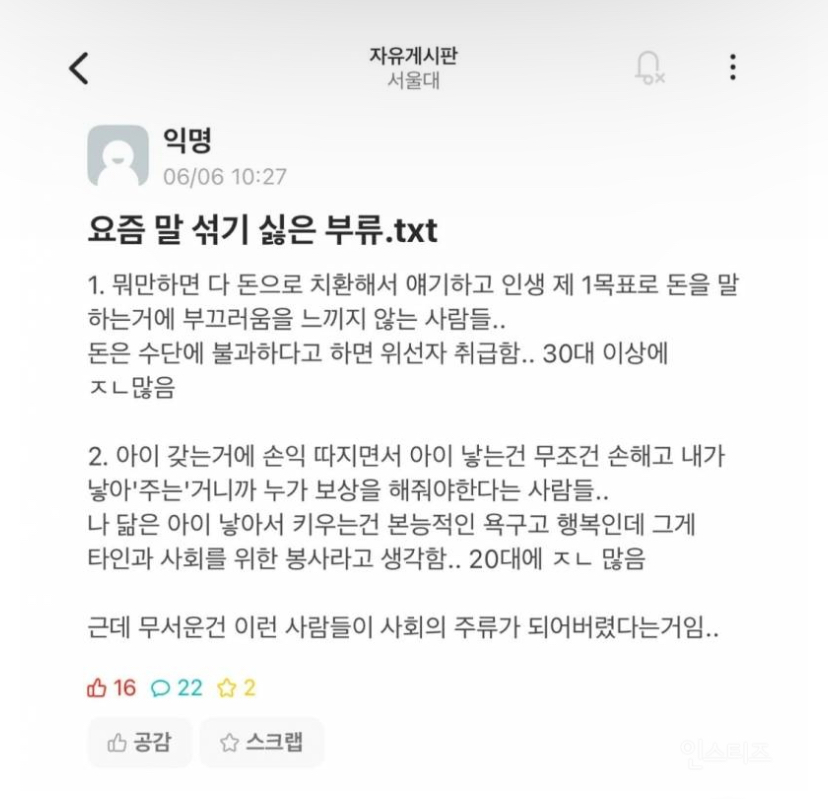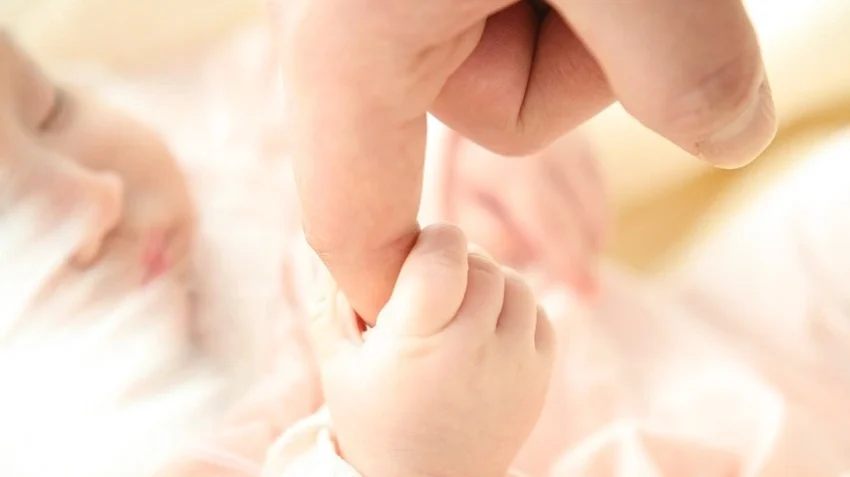The post criticizes people who view having children solely as a financial burden and demand compensation, while the theqoo members react with hostility. However, some women offer rational counterarguments, emphasizing that child-rearing should be seen as a shared joy and responsibility, not a forced obligation.
Seoul National University Post Sparks Discussion on theqoo
A post with the following content was uploaded to Seoul National University’s Everytime. When this post was shared on the Korean community theqoo, it garnered numerous comments from members.

These days, there are certain types of people I prefer not to engage with:
Those who translate everything into monetary terms and openly declare money as their primary life goal without any sense of shame. They consider anyone who says money is merely a means to an end as a hypocrite. This attitude is especially prevalent among people in their thirties and older.
Those who calculate the costs and benefits of having children, claiming that having children is a net loss and that they should be compensated for ‘giving birth’ to them. They fail to see that having and raising children who resemble oneself is a natural desire and a source of happiness, instead viewing it as a service to others and society. This mindset is particularly common among people in their twenties.
The alarming part is that such people have become the mainstream in society.”
Hostile Reactions from theqoo Members
Members of the theqoo community responded to this post with expletive-laden comments, even going as far as to insult the author by calling them a “womb-less creature.” They claimed that the instinctual desire and happiness associated with having and raising children only apply to men. In essence, they argued that for women, the desire to have and raise children is not instinctual. However, some users also pointed out that those who chose to have children out of their own desire shouldn’t expect social welfare benefits.
Support for the Original Post
Some comments expressed agreement with the original post, lamenting that today’s society has lost its sense of romance, as people dislike experiencing losses and often think in terms of monetary gain. Additionally, there were sensible women who believed that whether or not to have children is a personal choice. They emphasized that those who haven’t had children, and don’t plan to, should not boast about childbirth. These users urged others not to criticize women who wish to have children.
Shared Parenting Responsibilities
It was also noted that men, too, should cherish and feel fulfilled by caring for their children, starting from their wives’ pregnancy through to shared parenting after the child’s birth. The idea here is that even men without a womb have a stake in pregnancy, childbirth, and parenting. However, the theqoo women often generalize by using bad examples of men, which is unfair.
Rebuttals to the “Solo Parenting” Argument
In response to the argument that using the term “solo parenting” is justified because most parenting falls on women, there were counterarguments. One pointed out that if someone’s surrounding environment is bad, it doesn’t mean everyone else must suffer the same fate. There are many men who take parental leave to care for their children attentively. It’s unfair to generalize and criticize all men based on negative experiences. The term “solo parenting” itself is nonsensical since children are immensely lovable, and the time spent with them is precious. The argument is that children should be regarded as precious, and using terms like “solo parenting” is disrespectful and offensive to them, as if they were born out of obligation.
Skepticism Towards Claims of Solo Parenting
Despite these reasonable arguments, some women still claim that they have the right to use the term “solo parenting” because they have experienced it. However, on theqoo, it is common for users to lie, making such claims questionable. It is not unusual for women to pretend to be men on the platform, adding to the distrust of such statements.
I appreciate you taking the time to read this post. Please share your thoughts in the comments!


Do Korean women just not want kids? Or is it just the girls on that theqoo community?